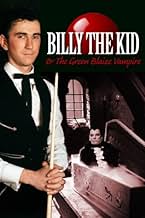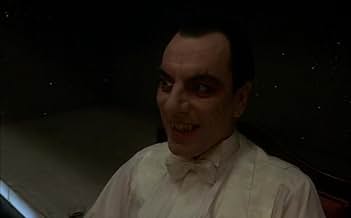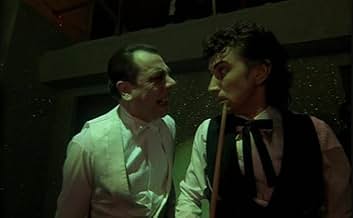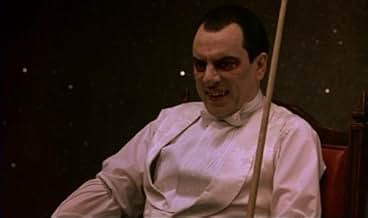IMDb RATING
5.6/10
368
YOUR RATING
Cocky snooker player Billy Kid faces six-time world champion Maxwell Randall in a grudge match with high stakes: the loser must retire from professional snooker forever.Cocky snooker player Billy Kid faces six-time world champion Maxwell Randall in a grudge match with high stakes: the loser must retire from professional snooker forever.Cocky snooker player Billy Kid faces six-time world champion Maxwell Randall in a grudge match with high stakes: the loser must retire from professional snooker forever.
Danny Webb
- TV Director
- (as Daniel Webb)
- Director
- Writer
- All cast & crew
- Production, box office & more at IMDbPro
Featured reviews
It's on DVD! (At last I can bin my beta-max tape.)
I tried a few years ago to put together a stage version of BTK&GBV but it was quite some task trying to work out who held the performance rights. When I spoke to George Fenton (the EXCEPTIONALLY talented composer) he was flattered by my interest in the score but had no idea if there were any copies still in circulation. Obviously I was disheartened not get any further with the project but worse still is that the film print seemed to have disappeared as well. Thank goodness the DVD has now appeared.
The cast is an interesting selection of talent, mostly seen on British TV rather than the movies. Never the less, an highly original musical - performed with GUSTO!
I tried a few years ago to put together a stage version of BTK&GBV but it was quite some task trying to work out who held the performance rights. When I spoke to George Fenton (the EXCEPTIONALLY talented composer) he was flattered by my interest in the score but had no idea if there were any copies still in circulation. Obviously I was disheartened not get any further with the project but worse still is that the film print seemed to have disappeared as well. Thank goodness the DVD has now appeared.
The cast is an interesting selection of talent, mostly seen on British TV rather than the movies. Never the less, an highly original musical - performed with GUSTO!
At it's time of making, Snooker Tournaments were big pullers for TV audiances in the UK so it is suprising that this film didn't make it to the cult status that it might have made if repeat showings had taken place. I made an off-air copy onto a Video-8 tape which still plays via a digital camcorder (thank you Mr Sony) though I'm not sure whether it picks up the PCM digital soundtrack. I generally like watching any roles that Phil Daniels played, this may be zany, but it is still good
I've never gone back to comment on a film for a second time before. However, having finally managed to see BTK & the GBV on the big screen (never in a million years did I think I'd get that opportunity) I just had to say a few more words.
I long ago lost count of how often I've seen this film but I was amazed at how much detail is lost when viewing it on a TV screen. Not only can so much more of the background be seen but the actors' expressions are so much clearer, which means the whole event is that much more enjoyable. I also found that the clever and sometimes intricate editing was much more noticable on a larger screen. I didn't mention him in my first review but Stephen Singleton did a brilliant job as editor and it's not surprising to find that he's been such a fixture in the work of various members of the production team.
When the National Film Theatre announced that they were doing a 'Focus on Alan Clarke' season, I didn't think for one moment that his most obscure movie would be included in the line-up. As one of the twenty or so people in that cinema, I sat there with a big grin on my face from beginning to end. I just couldn't believe my luck.
This really is surreal film making at its very best and a fine testimony to the brilliance of the late Alan Clarke.
I long ago lost count of how often I've seen this film but I was amazed at how much detail is lost when viewing it on a TV screen. Not only can so much more of the background be seen but the actors' expressions are so much clearer, which means the whole event is that much more enjoyable. I also found that the clever and sometimes intricate editing was much more noticable on a larger screen. I didn't mention him in my first review but Stephen Singleton did a brilliant job as editor and it's not surprising to find that he's been such a fixture in the work of various members of the production team.
When the National Film Theatre announced that they were doing a 'Focus on Alan Clarke' season, I didn't think for one moment that his most obscure movie would be included in the line-up. As one of the twenty or so people in that cinema, I sat there with a big grin on my face from beginning to end. I just couldn't believe my luck.
This really is surreal film making at its very best and a fine testimony to the brilliance of the late Alan Clarke.
As a long time snooker fan I'd heard whispers about this film for years and it was only recently after months of searching that I finally managed to get hold of a copy. It's true that only Channel 4 in its early days could throw up something as bizarre as Billy the Kid and The Green Baize Vampire. By the same token snooker was the most popular sport in Britain in the mid-80's so making a film about it and its rivalries (players, managers, fans and everything that they stood for) was perhaps less of a risk then compared to how it might now seem.
As sports films go it's not bad but neither is it great. Perhaps the most unfortunate thing about the film is that the real snooker world was throwing up its own unparalleled sporting drama at the time, be it the black ball finish in the 1985 World Championship between Dennis Taylor and Steve Davis or, more to the point, the riveting rivalry between Davis and Alex Higgins who really were like chalk and cheese. One had a squeaky-clean image, the other was a lovable rogue with a penchant for vices and they both hated each other's guts. The rivalry between Maxwell and Billy or indeed the players they are based on (Dracula look-alike Ray Reardon and new kid on the block Jimmy White) could never evoke the same passions and even then Phil Daniels and Alun Armstrong, talented as they are, are slightly unconvincing here. Like most young upstarts Daniels (resembling Dexy's Kevin Rowland more than Jimmy White) reels off a few cocky taunts but he's far from the booze fuelled, authority-hating and downright rude figure that Higgins was. The whole thing feels like little more than your token pre-match jibing session and it's not helped by the fact that the humour is laboured as well. Granted, the idea of both players having completely different sets of followers and standing for completely different ideals and generations is well handled but even then a far better illustration of this would be to witness the audience reaction when Higgins and Davis crossed cues in front of 3,000 people in the 1985 Masters at the Wembley Conference Centre.
In saying all this I think it's important to appreciate how difficult an obscure project like this must have been to tackle and those who did so obviously weren't afraid of trying something different. Furthermore even though this film ends up being something of a failure it does nevertheless contain enough flashes of brilliance to convince you that there is a really unique talent behind it all and one that has done or probably could do a lot better. Despite being entirely studio bound and having a limited budget, the whole thing is shot with real class and looks wonderfully expensive. I love the dimly lit snooker halls, Maxwell's creepy pad really brings those fantasy images of Reardon to life, there are a few memorable quotes and the costume department do a good job here too. It's also worth noting that there is none of that dodgy editing, typical of sports movies, whereby a player hits a ball a mile away from the pocket and yet it miraculously manages to reach its intended target. As for the music, well, it's a little bit uninspired and at times feels like it's fleshing out a script lacking in ideas but the film does open with an excellent jaunty sax sore, evoking shades of Francis Monkman's score for The Long Good Friday, and Billy launches his comeback near the end to the strains of a catchy little piece called 'The Fame Game'. Alan Clarke was, of course, the man behind it all and while this is ultimately one of his less memorable moments it was nonetheless an interesting little venture/ indulgence.
As sports films go it's not bad but neither is it great. Perhaps the most unfortunate thing about the film is that the real snooker world was throwing up its own unparalleled sporting drama at the time, be it the black ball finish in the 1985 World Championship between Dennis Taylor and Steve Davis or, more to the point, the riveting rivalry between Davis and Alex Higgins who really were like chalk and cheese. One had a squeaky-clean image, the other was a lovable rogue with a penchant for vices and they both hated each other's guts. The rivalry between Maxwell and Billy or indeed the players they are based on (Dracula look-alike Ray Reardon and new kid on the block Jimmy White) could never evoke the same passions and even then Phil Daniels and Alun Armstrong, talented as they are, are slightly unconvincing here. Like most young upstarts Daniels (resembling Dexy's Kevin Rowland more than Jimmy White) reels off a few cocky taunts but he's far from the booze fuelled, authority-hating and downright rude figure that Higgins was. The whole thing feels like little more than your token pre-match jibing session and it's not helped by the fact that the humour is laboured as well. Granted, the idea of both players having completely different sets of followers and standing for completely different ideals and generations is well handled but even then a far better illustration of this would be to witness the audience reaction when Higgins and Davis crossed cues in front of 3,000 people in the 1985 Masters at the Wembley Conference Centre.
In saying all this I think it's important to appreciate how difficult an obscure project like this must have been to tackle and those who did so obviously weren't afraid of trying something different. Furthermore even though this film ends up being something of a failure it does nevertheless contain enough flashes of brilliance to convince you that there is a really unique talent behind it all and one that has done or probably could do a lot better. Despite being entirely studio bound and having a limited budget, the whole thing is shot with real class and looks wonderfully expensive. I love the dimly lit snooker halls, Maxwell's creepy pad really brings those fantasy images of Reardon to life, there are a few memorable quotes and the costume department do a good job here too. It's also worth noting that there is none of that dodgy editing, typical of sports movies, whereby a player hits a ball a mile away from the pocket and yet it miraculously manages to reach its intended target. As for the music, well, it's a little bit uninspired and at times feels like it's fleshing out a script lacking in ideas but the film does open with an excellent jaunty sax sore, evoking shades of Francis Monkman's score for The Long Good Friday, and Billy launches his comeback near the end to the strains of a catchy little piece called 'The Fame Game'. Alan Clarke was, of course, the man behind it all and while this is ultimately one of his less memorable moments it was nonetheless an interesting little venture/ indulgence.
I've been wanting to see this movie for years, and just caught a very rare screening at the National Film Theatre. There were maybe twenty people there, and if there was any justice the place would have been standing-room only. Whatever about that, those of us who made it had a good time. This is one of the strangest and most entertaining British films, certainly of the Eighties, and probably of the entire twentieth century. You may be reminded of other movies (I thought of Ken Russell's wild set designs, and also Eraserhead) but there really is nothing to compare it to... The performances are broad, cartoonish even, but well-judged. They never topple over into self-parody. Phil Daniels is as good as ever, but I was especially impressed by Bruce Payne (a new name to me) who does a great job with the least defined role in the movie, 'T.O.', Billy's manager, the weak link in the chain, the craven gambling addict whose need puts Billy in danger of losing his career (but whose eye for the main chance is the reason he has a career at all...) The songs are kind of a mixed bag, bit when they're good (as they are through all of the outlandishly gripping final snooker game) they're much better than 'Tommy', for instance, and Phil Daniel's final stream-of-consciousness number, foreseeing his bright but banal future, wouldn't sound out of place on a Blur CD.... It looks unlikely that this is ever going to come out on video let alone DVD, but if any freakish chance allows you the opportunity to see it, then do. You won't be bored. Bewildered maybe, confused perhaps, laughing like a drain hopefully. But definitely not bored.
Did you know
- TriviaThe characters Billy the Kid and Maxwell Randall, aka the Green Baize Vampire, are inspired by real-life snooker players Jimmy White and Ray Reardon, aka Dracula, respectively.
- ConnectionsReferenced in Home Nations Series: 2016 Northern Ireland Open: Day 5, Part 1 (2016)
- How long is Billy the Kid and the Green Baize Vampire?Powered by Alexa
Details
- Release date
- Country of origin
- Language
- Also known as
- Billy the Kid and the Green Baize Vampire
- Filming locations
- Production companies
- See more company credits at IMDbPro
Contribute to this page
Suggest an edit or add missing content

Top Gap
By what name was Rhapsodie en 3 bandes (1985) officially released in Canada in English?
Answer




























